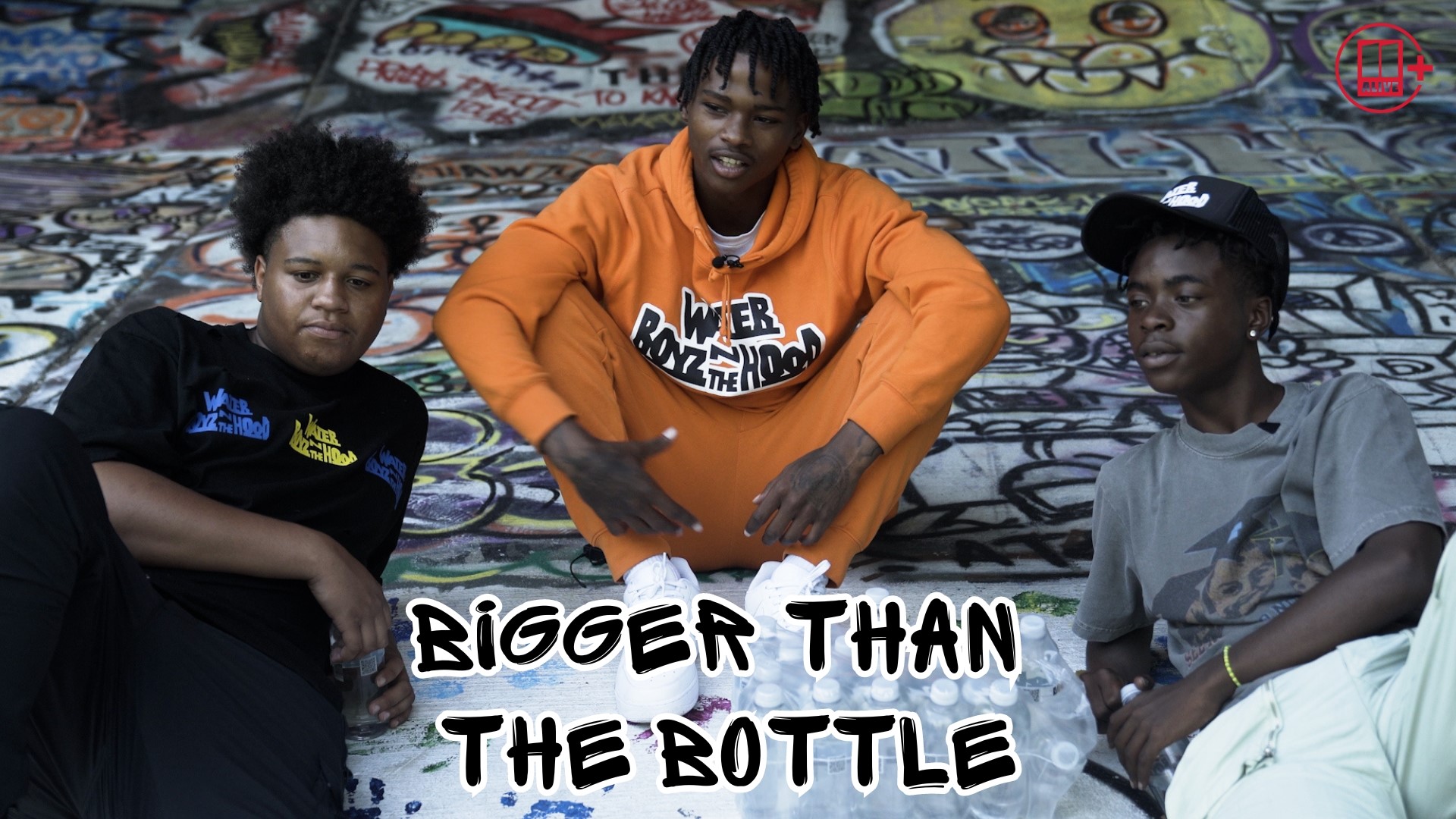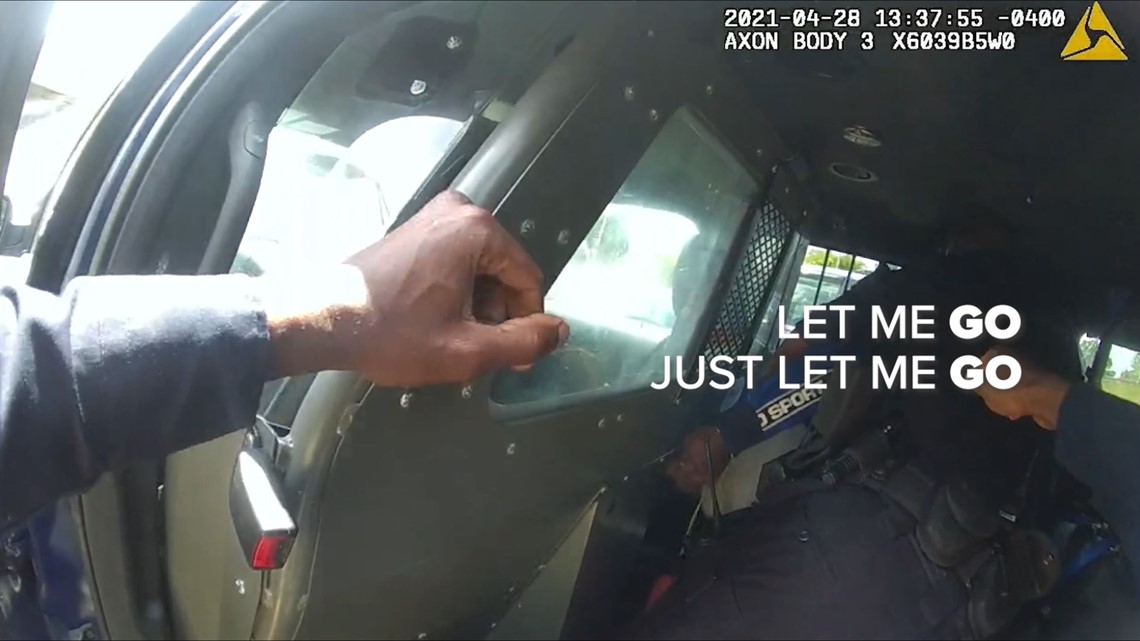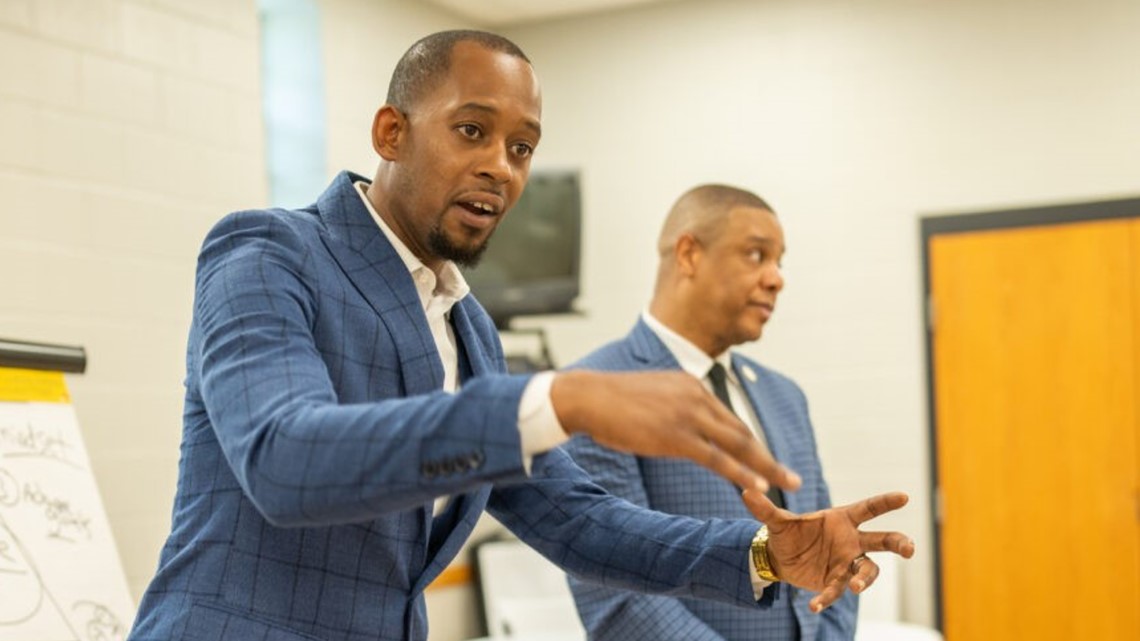Deep dive into the phenomena of Atlanta's 'water boys' | Bigger than the Bottle
This is a longtime Atlanta tradition that has always sparked in-depth conversations about poverty, entrepreneurship, and the safety of teens.

"Water Boys" in Atlanta. A cultural phenomenon that’s easy to spot – in viral videos and on busy intersections – but it’s not always as easy to understand.
During summer months and at popular events in Atlanta, youth can be seen walking along roads and near highways and running across intersections to sell water bottles. This is a longtime Atlanta tradition that has always sparked in-depth conversations about poverty, entrepreneurship, and the safety of teens.
Here's a deep dive into their multi-layered lived experiences in Atlanta: from successes and struggles to those looking to give the youth more hope.
From Street Hustle to Company
A trio of young entrepreneurs who started as Atlanta youth selling water on the roadside have evolved into a thriving business called "Water Boyz 'N the Hood." Amir, Serg, and Mekhi, who began selling water bottles after school around nine years ago, have transformed their passion into a brand beyond hydration.
"You either got it, or you don't," Amir, co-owner of Water Boyz 'N the Hood, said. "It can't be on you. It's gotta be in you."
The three, driven by a desire to support their families and stay out of trouble, turned their hustle into a business, creating a line of merchandise, including hoodies, hats, T-shirts, and branded water bottles.
Get to know the young entrepreneurs in their videos below by clicking their names and then the exclamation point. This story continues below the interactive element.
During the COVID-19 pandemic, their hustle caught the attention of a filmmaker, who looked to document their journey.
"The bottle is way bigger than just part of their hustle; a water boy's story is bigger than just a bottle," Greg Williams, a filmmaker and former Atlanta youth who sold water, said. "Water is a life resource; everybody needs water to live."
This story continues below the video.
Watch the full episode here:
Law Enforcement's Interactions with Atlanta Youth Selling Water
Unfortunately, the nature of selling water bottles on the street often brings with it the attention of law enforcement. Since 2021, the Atlanta Police Department said it has counted over 100 reports in its database containing keywords like "water boy."
Earlier this year, 11Alive obtained two body-worn camera videos and various incident reports from APD via public records requests to find out more about the interactions between youth and police.
In the video, a teen is being arrested by an APD officer and pleads, "Let me go," as they place him into the patrol car.
"You're (expletive) my life," the teen can be heard screaming later in the video.


Interactions like this show how selling water to help one's family could land many teens in handcuffs, and now marked by law enforcement as troublemakers, they could have even fewer options once they're released.
Georgia NAACP President Gerald Griggs echoed this during an interview with 11Alive's Neima Abdulahi, stating that these tense interactions also could prove to be damaging to the community in the long run, adding that incidents that result in charges just put more kids in the system leading to more significant problems.
"If I'm going to get a record for selling water for a dollar, I might as well sell something else for large amounts of money," he said.
Watch the full episode here:
Sip of Reality: Honoring Jalanni Pless
The viral moments seen online often spark debates about the safety of not only the commuters who are approached aggressively but also the children selling water.
That discourse only hits closer for Tomeka Pless, an Atlanta mother whose son was shot and killed selling water in Midtown Atlanta.
It happened in 2020; 18-year-old Jalanni Pless was out selling water along 8th Street in Midtown, blocks from busy Peachtree Street. The family said that when the incident happened, they believed it was all over a $10 bill.
Jalanni Pless' friends said he was selling water when another teen tried to sell to the same customer. The customer gave the 18-year-old $10, leading to a fight. The other teen left but returned with a gun and started shooting.
"Ten dollars is what caused Jalanni his life. Ten dollars. Think about that," she said to 11Alive in 2020.
Tomeka Pless now keeps the memory of her son close, decorating her apartment with his legacy.
“Everything that I put in that backpack that day before he walked out the door is still in the bag,” Tomeka Pless said.
For more coverage on Jalanni Pless' death, click the headlines below. This story continues below the interactive element
The Douglas High School graduate had a full-time job when he was killed, his mother adding that he sold water bottles as a side hustle to put toward a car and to help out more at home. His motive is no different than any other of the countless Atlanta kids and teens out near busy roads asking strangers to spend dollars on water.
The U.S. Census Supplemental Poverty Measure report shows a doubling of child poverty rates from 2021. Those born into poverty in Atlanta have just a four percent chance of escaping it, according to the Atlanta Wealth Building Initiative.
But the damage is done for mothers like Tomeka Pless: her son is gone. She now pushes forward to honor his life by raising awareness about why selling water to Atlanta youth is much bigger than the water bottle.
“I’ve been trying to start the Jalanni Bill for a while now,” she said. “Like, at first, I wanted to ban the Water Boys, but that’s how they survive. This (is) how most of them take care of their households.”
Instead, she also wants to encourage youth to find allyship amongst the hustle of a water bottle sale.
Watch the full episode here:
Antonio Lewis: From Street Hustling to City Official
For many, the outcome is bleak, with some lives like Jalanni Pless ending in tragedy. Others could find a more fortunate future. For one Atlanta city council member, selling on the street is where he got his start.
Antonio Lewis' childhood was marked by adversity, as his mother was tragically murdered when he was just 2 years old. Despite the challenges, Lewis found alternative ways to support himself, such as selling peanut brittle.
"I remember going to different malls across the city. I remember going to different retail stores,” Lewis said.


Drawing parallels to his past, he emphasizes the importance of channeling hope into constructive avenues, particularly for teenagers selling water bottles on street corners.
“Getting it how you live is different in this city. To me, getting it how you live might be pull up. Pull up every day until they hire you,” he said.
Reflecting on his own experiences, Lewis recognizes the struggles of Atlanta's youth and strives to be a positive example.
Watch the full episode here:
Opportunity for Atlanta Youth: Resources
One thing that stories of success and adversity have in common is the people involved and on the sidelines who decided to step in and help. Two Atlanta nonprofits are doing just that to bring optimism for the future of youth.
'You have value, and you have purpose’
Director of the Next Level Boys Academy, Gary Davis Sr., recognizes the silent cries for help from Atlanta's Black boys and young men. Motivated by the need for a supportive space, he established an after-school program focused on mentorship as a pathway to success. Davis, a father of three young men himself, believes in teaching the youth the distinction between pursuing material gains and achieving genuine success.
The academy serves as a refuge for boys and young men from various backgrounds, offering a non-judgmental environment for self-expression, especially outside traditional outlets like the music studio. Drawing from his own life experiences, Davis guides the academy's members away from a blurred and uncertain future, instilling the belief that positive change is possible.
“By the time they get to us, they've been so traumatized and victimized, socialized, and all of these things, that is they're so far, and they're so deep in it, there's only so much we could do," Davis said. "So, in order to come to us, first, you're gonna have to want it."
This story continues below the video.
Davis emphasizes the importance of visibility for Black boys and teens, asserting their value and purpose in a world that may overshadow them. His approach combines genuine care with a realistic outlook, incorporating prevention and intervention strategies. As part of the City of Atlanta's "Year of the Youth" initiative, the Next Level Boys Academy aims to address the needs in Atlanta, with Davis holding weekly worship sessions for local youth.
'Bringing awareness and attention'
Founded in 2009 by KaCey Venning and Marc "Coach" Boyd, the program addresses the significant challenges Black youth face in poverty.
The HEY program, situated blocks away from Bankhead and the Trap Music Museum, continues to provide a unique community-based safety net for Atlanta's Black male youth.
“I want to stand in the gap for them,” Atlanta Helping Empower Youth Executive Director and co-founder KaCey Venning said.
This story continues below the video.
HEY offers a range of activities, including hands-on projects, leadership training, emotional well-being support, STEM education, and more. The organization serves as a judgment-free zone for vulnerable youth, offering guidance and tough love with a focus on love first.
The program's home, once the site of a tragic incident involving the shooting of 92-year-old Kathryn Johnston by police in 2006, has transformed into a safe haven. The co-founders, Venning and Coach Boyd, act as parental figures, imparting valuable life lessons and skills to the youth.
In October, the program faced a setback when its kiosk was vandalized over the weekend. The kiosk, set up for the program's youth, was broken into, resulting in the loss of thousands of dollars in merchandise.
As the stories of triumph and hardship intertwine in the city of Atlanta, the phenomenon emerges as a complex narrative of resilience and challenges.
From the evolution of young entrepreneurs turning street hustle into the thriving brand "Water Boyz 'N the Hood" to the sometimes harsh encounters with law enforcement faced by those selling water on the streets. The contrast in opportunities and obstacles is stark, showing the crucial role of mentorship, community support and a collective effort to uplift the next generation.
Watch the full series below:

